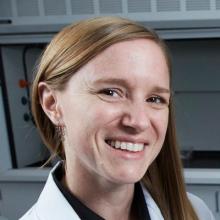Rochelle Hines
What are your main responsibilities or activities in your current position?
Direct an independent research program, teach and engage in service related to the field of neuroscience.
How does your current work relate to your graduate degree?
My PhD provided the cornerstone for my current employment. During my PhD the most critical skills that I gained were problem solving, resilience and overcoming adversity, these have all proven central in scientific research! Most importantly, I learned about myself, my skills and strengths and managing my weaknesses, gaining confidence about what I could accomplish.
What do you like and what do you find challenging about your current position?
Each project is like a new quest, I get to explore all of the time.
What motivated you to pursue graduate work at UBC?
The work that was going on in the lab of my original mentor, Dr. Alaa El-Husseini.
What did you enjoy the most about your time as a graduate student at UBC?
UBC is a great environment with a lot of world class research and work, but with an open atmosphere.
What key things did you do, or what attitudes or approaches did you have, that contributed to your success?
When experiments failed or became difficult, I dug in instead of turning away.
What is your best piece of advice for current graduate students preparing for their future careers?
Explore career possibilities outside of academia early on, tenure track faculty positions are becoming difficult to obtain in some fields of work and it is important to be realistic about what other amazing options are out there.
Did you have any breaks in your education?
I took a year off after my undergraduate and worked as a research technician, this was not necessarily planned but turned out to be beneficial; when I applied to grad school I had contributed to seven peer-reviewed journal articles and learned several challenging laboratory techniques.
How did you find out about/obtain your current position?
Searching online for academic postings.
What challenges did you face in your graduate degree, or in launching your career?
The most challenging thing that I faced as a graduate student was the loss of my supervisor, Dr. Alaa El-Husseini. This tragic situation was extremely difficult to navigate, emotionally and practically. It took some time and distance, but from this incredible loss, I learned a lot about my capabilities. This period of time taught me not to "...fear difficult moments. The best comes from them." (Rita Levi-Montalcini), which is a quote that I still use in my email signature. It would be great if I could have had this realization, and not have lost such an amazing mentor, other than that I wouldn't change a thing!
How are jobs normally posted and filled in your organization or industry?
Online and in journal publications. Word of mouth / nepotism is also a large factor.
